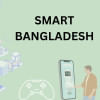The unstoppable journey towards a Smart Bangladesh

The announcement of Digital Bangladesh Vision 2021 was proclaimed in 2009. 13 years later, keeping up with the growing global changes, the government aims to establish Smart Bangladesh - a developed and prosperous country by 2041 through the transition to a knowledge-based economy.
Several studies found that, by 2041, Bangladesh is bound to move forward from a labour-driven economy to an advanced knowledge-based economy. This monumental vision can only be ensured if we can meet the goal of having a population with a per capita income of US $12,500, up from the present level of US $2,824.
Policymakers of Bangladesh have already identified and created a 14-point action plan to materialise the vision of building a Smart Bangladesh. The elements of 'Smart Bangladesh 2041' will mostly include smart education, smart health care, smart agriculture, smart trade, smart transportation, etc.
In the past decade, the achievement and milestones reached by us as a nation in the digital sphere were not insignificant.
In the past decade, the government has prioritised projects under the Digital Bangladesh initiatives to rapidly expand online accessibility in the hopes of opening the door for extensive economic growth. Part of these initiatives included an award-winning project of creating a wide network of over 8,500 Digital Centres to offer online services to the last mile folks. The government also created 86,000 digital classrooms and trained almost 1.5 million kids in information technology.
The contribution of ICT as a sector to the economy has also seen a meteoric rise. The exports of information technology have surged, rising from roughly $25 million in 2008 to $2 billion in 2021. The Business Processing Outsourcing (BPO) industry in Bangladesh has also grown significantly. The BPO industry is expanding at a rate of about 24% per year. The industry generated around US $4 million in revenue in 2008. Currently, the industry brings in around US $68 million annually and employs almost 45,000 people.
Bangladesh has also seen a rapid increase in its skilled freelancing community. Bangladesh right now is home to the world's second-biggest pool of freelancers in a world where the gig economy is growing at a rapid pace.
The landscape of the hardware industry of Bangladesh has dramatically changed. Bangladesh is now locally assembling the majority percentage of mobile phones within Bangladesh. Some smartphone brands are even exporting their products to neighbouring countries. To facilitate the growth of the hardware industry, Bangabandhu Hi-Tech City (BHTC) has been established. This industrial park with an area of 355-acre is expected to house state-of-the-art facilities for tech-based industries. Around 70 tech companies have invested millions of dollars in BHTC to manufacture world-class tech-based products in Bangladesh. Additionally, Bangladesh Hi-Tech Park Authority (BHTPA) joined forces with the Asian Institute of Technology (AIT) to improve the research and development of the IT industry. Essentially, this will lead to the upskilling of the youth in crucial topics, including cyber security, blockchain, artificial intelligence, etc.
Digital Bangladesh also saw massive success with its Surokkha platform. The ICT Division built the Surokkha mobile app and web portal to conduct the initial registration process to distribute the Covid-19 vaccine among citizens. Over 5 million people downloaded the app from Google Play and the platform was instrumental in ensuring that the mass population came under the vaccination program during the pandemic.
However, the journey towards achieving the vision of a smart and digitally inclusive Bangladesh is far from over. The Internet, the very driver of this revolution, is far from being affordable in Bangladesh. Slow internet speeds cause latency for most internet users on the go. Bangladesh ranked 125th in the world for mobile internet speeds out of 139 countries in September 2022, according to Ookla, a global platform that generates internet speed reports across the globe. Despite the e-commerce industry booming, several e-commerce platforms have swindled millions and affected the growth of the industry.
In addition, a government review found that the 761 digitised services were not being used properly due to slow servers and unreliable internet. According to an assessment of 67 particular digital services by the Central Procurement Technical Unit (CPTU), some services are no longer available. The participants reported encountering several issues while obtaining e-documents, e-passports, machine-readable passports, and e-trade licences, among other things.
Another initiative that did not live up to its expectations was the home-grown public apps. Apart from a few apps like Surokkha, the majority have been removed from Google Play due to a lack of maintenance. In 2011, the state-owned Telephone Shilpa Sangstha (TSS) assembled the country's first laptop. Initially, four models were offered, and the prices for the laptops started at Tk 10,000. But the Doel laptops showed significant performance issues, leading to the project getting suspended. However, TSS is trying to make a comeback as the government is considering declaring it as a hi-tech park to attract local and foreign investments.
Additionally, the digital divide, i.e. the gap that exists for accessing information through ICT for urban and rural users across the country, widens when there are power failures, causing the servers to go down frequently. This has recently hampered the productivity of many freelancers across the country, as they haven't been able to access uninterrupted internet services due to the frequent power cuts.
So the journey towards a Smart Bangladesh is far from over. Capitalising on the demographic dividend, it is possible to strengthen Bangladesh's position on the world map by bringing innovative ideas. Only then we would be able to build an advanced and knowledge-based "SMART BANGLADESH".

 For all latest news, follow The Daily Star's Google News channel.
For all latest news, follow The Daily Star's Google News channel. 








Comments